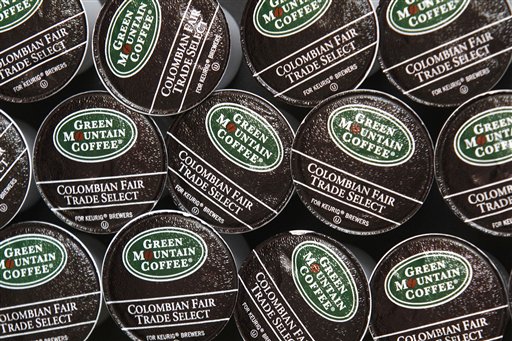MONTPELIER, Vt. — Two stalwarts in the fair-trade coffee movement are at odds over a move by a national certifying organization to expand beyond small, farmer-owned cooperatives and allow larger growers to sell their product with a fair trade label.
Equal Exchange in West Bridgewater, Mass., took out a full-page ad Sunday in The Burlington (Vermont) Free Press calling on Waterbury-based Green Mountain Coffee Roasters to sever relations with Fair Trade USA.
Equal Exchange criticized Fair Trade USA for leaving an international umbrella group devoted to fair trade and for inviting larger coffee plantations into the fair trade fold.
“With this move, they threaten to reverse decades of hard-won gains while potentially putting at risk the very survival of the farmer cooperatives,” it said.
FTUSA remains the dominant player in the U.S. in affixing a label to products as a signal to socially conscious consumers that the producers of coffee and other products grown in developing countries are being paid a fair price. Farmers get a $1.40 per pound “floor price” — a minimum maintained even if commodity markets go lower; a 20-cents-per-pound “social premium,” which pays for communal benefits like health clinics or schools, and an extra 30 cent premium if the coffee is organic.
FTUSA President and CEO Paul Rice said expanding the market for fair trade products will help all farmers. He cited the case of an estate in Brazil that recently began using the fair trade label on coffee it sells to the Whole Foods chain for its Allegro brand. The Fair trade coffee that carries the “social premium” of 20 cents a pound could now go both to the estate and to small farmers that also provide coffee for Allegro.
Workers on the estate voted to put the roughly $15,000 they earned from the premium toward eye exams and glasses for those among their number who needed them.
“The notion that co-ops should have exclusive access to our markets is just wrongheaded from a marketing perspective,” Rice said.
Rodney North, spokesman for Equal Exchange, was not impressed with the Allegro example. He argued that new sales of that brand to “committed Fair Trade shoppers” merely would take market share away from the co-ops where their previous coffee was coming from.
The fair trade movement started about a quarter century ago as a way to boost the fortunes of poor farmers in developing countries by getting them better prices for the crops they produced. While coffee has been dominant in a market that saw $1.3 billion of fair trade product sales in the United States in 2010, the field has grown to include cocoa, bananas and other crops.
At Green Mountain Coffee Roasters, officials said they want to continue to support the small farmer cooperatives that have formed the backbone of the fair trade movement to date, as well as see whether Fair Trade USA can expand the concept to encompass a broader swath of the coffee supply chain.
Ed Canty, a certified coffee buyer for Green Mountain who travels extensively in coffee producing countries, said what has worked for the farmers who belong to cooperatives should have a similar effect of improving the lives of farmworkers on coffee plantations.
“Why can’t these workers, who are some of the poorest of the poor, in some of these estates be involved as well?” he asked in an interview with The Associated Press on Monday from the company’s headquarters in Waterbury.
As it announced new policies on a pilot basis last fall, Fair Trade USA split from an international umbrella organization, Fairtrade International. The changes prompted Equal Exchange, which also imports chocolate, tea and bananas on a fair-trade basis, to split from Fair Trade USA and push for other companies, including Green Mountain, to do the same.
Equal Exchange praised Green Mountain for its past work with the farmer cooperatives, but questioned whether the company understood the possible ramifications of Fair Trade USA’s moves.
“We think that they don’t fully grasp how these changes by Fair Trade USA could undo the good work that Green Mountain has been supporting,” North said Monday.
North said Equal Exchange decided to buy the newspaper ad after talks between its executives and Green Mountain’s had not produced results.
“It was clear there was quite a gap between us and we would need to do something more dramatic,” he said.
Canty said the similarities between the factions in the fair trade movement still outweigh the differences, and that his biggest worry is that the rift could cause harm to the principle of fair trade overall.
“It’s really splitting hairs. I think everybody involved in this discussion is doing good,” Canty said. “I’m hoping the consumer sees that at the end of the day, but it’s a really hard message.”
Send questions/comments to the editors.



Comments are no longer available on this story